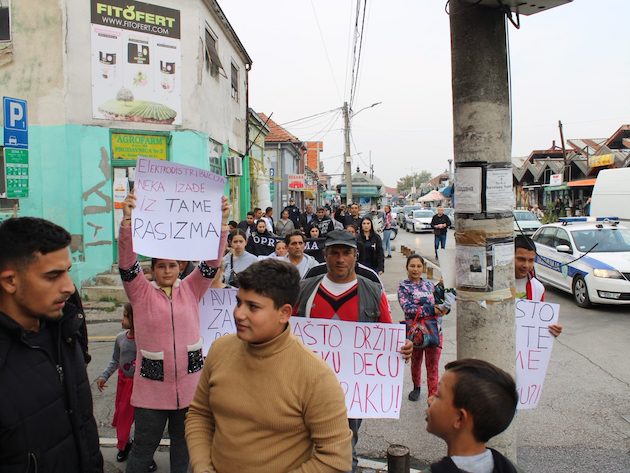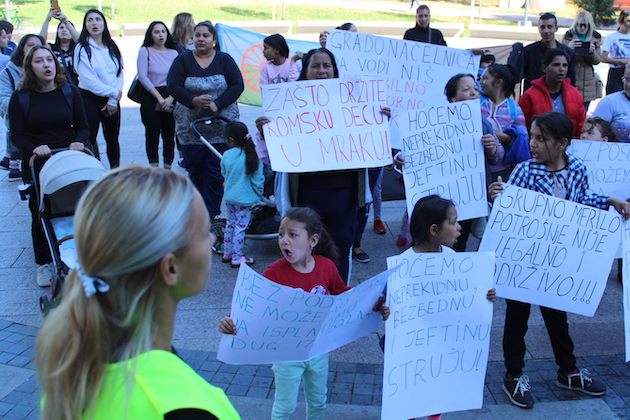Summary:
-
Many of Europe’s 12 million Roma people have a low living level, and energy poverty was widespread in many communities even before the energy crisis.
-
At least 10% of the approximately 6 million Roma people who reside in EU nations do not have any access to electricity, according to estimates.
-
According to data gathered by his organisation, a quarter of all Roma houses have had their energy turned off since the crisis began because they cannot make ends meet.
-
While this is going on, advocates for the Roma in other nations are concerned that politicians would use the energy crisis as a pretext to disregard the long-standing issues of energy poverty among the Roma or even to enable Roma settlements to be cut off from supplies.24 families living in the “12 February” Roma colony in the southern Serbian city of Nis had their energy switched off in May this year due to unpaid payments.
-
During the energy crisis, politicians hope to be able to cut off electricity to Roma villages without encountering too much opposition or public outcry.

Experts worry that the Roma, the most significant minority on the continent, may be left behind as European households brace themselves for energy shortages this winter and authorities prepare support packages to help them heat their homes in the coming months.
Many of Europe’s 12 million Roma people have a low living level, and energy poverty was widespread in many communities even before the energy crisis.
Governments are urged to ensure that one of the most vulnerable populations on the continent receives the assistance they require this winter and beyond. Roma leaders and rights organisations claim that the current crisis has worsened the issue.
Zeljko Jovanovic, director of the Open Society Roma Initiatives Office at the Open Society Foundations (OSF), told IPS that “EU leaders and policymakers must ensure that energy policies already agreed, or any agreed in the future, must be tailored and implemented in such a way that the most vulnerable, including the Roma, can access and benefit from them.”
The Roma is one of Europe’s most marginalised and discriminated against communities. Significant populations frequently reside in segregated neighbourhoods with subpar living conditions and pervasive acute poverty.
Energy insecurity is also widespread. At least 10% of the approximately 6 million Roma people who reside in EU nations do not have any access to electricity, according to estimates.
 After 24 families in the “12 February” Roma hamlet in the southern Serbian city of Nis had their energy switched off due to unpaid bills, the Roma community protested. The predicament of the Roma during the energy crisis is being called for consideration by European nations. Opre Roma Srbija is to blame.
After 24 families in the “12 February” Roma hamlet in the southern Serbian city of Nis had their energy switched off due to unpaid bills, the Roma community protested. The predicament of the Roma during the energy crisis is being called for consideration by European nations. Opre Roma Srbija is to blame.This year’s increase in energy prices has made the issue worse. Although governments have provided one-time grants and various forms of assistance for families and companies to pay their energy bills, rights campaigners claim that this aid frequently does not reach Roma despite the minority group being among those who are most in need.
Only one in four Roma aged 16 or older reported having a job, and many labour in the grey or black economy to make a living. This indicates that there is a significant rate of unemployment among Roma communities. But as a result, individuals frequently have trouble enrolling in state assistance programmes. This is particularly valid for policies that offer financial support during the energy crisis.
“Energy poverty was an issue in Europe even before the energy crisis. It wasn’t perfect for the Roma because many did not participate in the formal system.”
For those who are part of the official system, measures are made for the energy crisis. Since many Roma are not enrolled in that system—whether they are working and contributing to the social security system, are unemployed, or are not correctly registered—they cannot take advantage of those measures, according to Jovanovic.
Roma NGOs operating in various nations claim to have previously encountered these issues.
A scheme has been started in Romania to assist the disadvantaged with energy payments; the Council of Europe estimates that 1.85 million Roma live in the country.
The Aresel civic initiative’s community organiser, Alin Banu, however, told IPS that some Roma is unable to use it precisely because “they work in the grey or black economy and don’t have the appropriate documentation of social security payments, salary, etc.”
Meanwhile, he alleged that even individuals qualified for assistance are frequently turned away. He claimed that some localities had made it impossible for people to receive help with their energy costs if they could prove they had a history of tax debt or had a car.
This is unlawful, claims the group.
The majority of Roma will not protest about this since they frequently won’t know it is prohibited, Balu said. “We have solved this problem in some circumstances,” he added.
There are also worries that already-implemented policies may make matters worse for Roma.
The EU countries’ leaders last year agreed to a non-binding target of reducing overall electricity demand by at least 10% by the end of March 2023, as well as a requirement to reduce electricity consumption by at least 5% during at least 10% of the week’s peak demand hours.
Jovanovic worries that the first measures taken by politicians to reduce energy use might be as simple as shutting off power to people who aren’t technically linked to the energy system.
Jovanovic stated that countries’ decreases in energy demand “could come from eliminating energy to those who do not have formal access to it, such as the Roma.”
Nicu Dumitru, a community organiser at Arsesel, concurred, saying that “the Roma would be the first to be cut off in that situation.” However, he added that even if that does not occur, many Roma is already struggling with rising energy prices.
According to data gathered by his organisation, a quarter of all Roma houses have had their energy turned off since the crisis began because they cannot make ends meet. They then establish ad hoc connections to the grid, frequently utilizing a single community member with a relationship and charging hefty rates for using that power, worsening their fragile financial circumstances by often borrowing money.
Informally linked to the electrical system in Romania are an estimated 400,000 persons, many of whom are Roma.
For Roma, the situation is becoming severe, said Dumitru.
While this is going on, advocates for the Roma in other nations are concerned that politicians would use the energy crisis as a pretext to disregard the long-standing issues of energy poverty among the Roma or even to enable Roma settlements to be cut off from supplies.
24 families living in the “12 February” Roma colony in the southern Serbian city of Nis had their energy switched off in May of this year due to unpaid payments. The family contend that this debt dated from before they moved in, but the local electricity provider required ownership documentation before reconnecting the families.
People in many Roma communities frequently lack these documents since getting them is expensive and challenging for many people without qualified legal assistance. None of these families could offer the necessary documentation.
Limited electricity supplies were only restored to the affected families in December after local and national protests by community members and negotiations between the families, who the Opre Roma Serbia rights group represented, local authorities, and the local distributor Elektrodistribucija Nis.
Opre Roma Serbia’s Jelena Reljic expressed her happiness that those impacted could now receive energy again but cautioned that “the situation in this settlement is an illustration of a much bigger systemic problem” that politicians are not doing enough to address.
“The last cutoff in this settlement occurred due to historical debt, but the electrical issues have persisted for ten years. During the energy crisis, politicians hope to be able to cut off electricity to Roma villages without encountering too much opposition or public outcry. She told IPS that 99% of the responses she has seen to the issue in this settlement have been along the lines of “well, no one should be getting an energy free during this crisis; we pay, so why shouldn’t they?
She continued, “Politicians are using the energy crisis to disguise the fact that they have ignored the issue of energy poverty for years and years.
Jovanovic of the OSF is urging European policymakers to reevaluate their suggested aid during the crisis, including not only the authorised cuts in energy demand but also plans for energy price caps and a solidarity levy on the profits of companies engaged in the oil, natural gas, coal, and refinery sectors.
According to him, the 5% reduction must not result in electricity cuts for people who are already living in energy poverty, and public funds from the energy cap and solidarity levy, which are expected to bring in €140 billion for the EU, should be redistributed by morally and macroeconomically sound principles.
He has participated in high-level EU committee meetings on energy crisis support programmes; nonetheless, he told IPS that at such sessions, “little concept of the perspective of Roma and other vulnerable groups and how they would survive with the crisis” seemed to be there.
He is currently working with other activists to set up additional meetings with EU and national officials to compel them to fix flaws in present laws affecting vulnerable communities, such as Roma.
He remarked, “We want to bring these problems up.
Analysis by: Advocacy Unified Network

